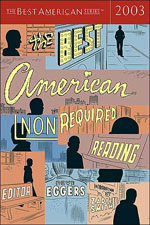[Transcribed discussion of “Enquire Within Upon Everything,” by Richard Powers, published in The Paris Review.
This story is a hypothetical chronicle of a boy’s life in the shadow of the internet age. The protagonist, an unnamed boy, grows up in a time when social interactions are increasingly subsumed by rapidly advancing technologies. At first, many of the technologies the boy uses are familiar to us, but as the story progresses, the ways he exists and interacts with people become more synthetic and strange. Towards the end of his life, the boy ultimately becomes dependent upon his virtual life and social networks. The title of the story refers to a book published in 1856 that was meant to provide encyclopedic information on all aspects of civic life. The precursor to the World Wide Web, “ENQUIRE,” was reportedly named for this book.]
Stephanie: I thought it was cool that the protagonist didn’t have a name, like he could just be anybody. People can project themselves onto him, and that makes the story more real and more true.
Adam: By the end of the story, I had forgotten that it was one big conditional statement. It turns into a projection of how human life could be developing, and raises questions about what’s good or bad about these developments.
Barnaby: I don’t think this story really has anything to do with the future. I’m thinking about the part where the boy learns that another person lived exactly like he did, but one hundred and forty years earlier – it ends up being about the relationship between humankind and technology.
Elise: The ways that humans interact with technology, and the degree to which technology controls our lives – that’s an idea that really seems to interest people right now. This story articulates that concept really well.
[The students were asked to give their thoughts on the emotionless delivery of the story’s major events.]
Elise: He didn’t express emotions to the reader, but the story still evoked an emotional response. I wanted to know “What might he be thinking? What might he be doing?” I felt that he didn’t need to tell us how he felt because the wonder is what keeps readers engaged.
Rachel: I think the writing style works. It just gives us the facts, but that’s exactly what the Internet is – there’s no emotion, only facts.
Adam: When the boy’s son runs away, he describes the event with no emotion. To him, it was just another mechanical development. I thought that was interesting. He didn’t say that his son was disgruntled with technology or with his father – he just decided to leave, to drop off the grid, maybe simply to find out if it was possible.
Subscribe to:
Post Comments (Atom)









No comments:
Post a Comment